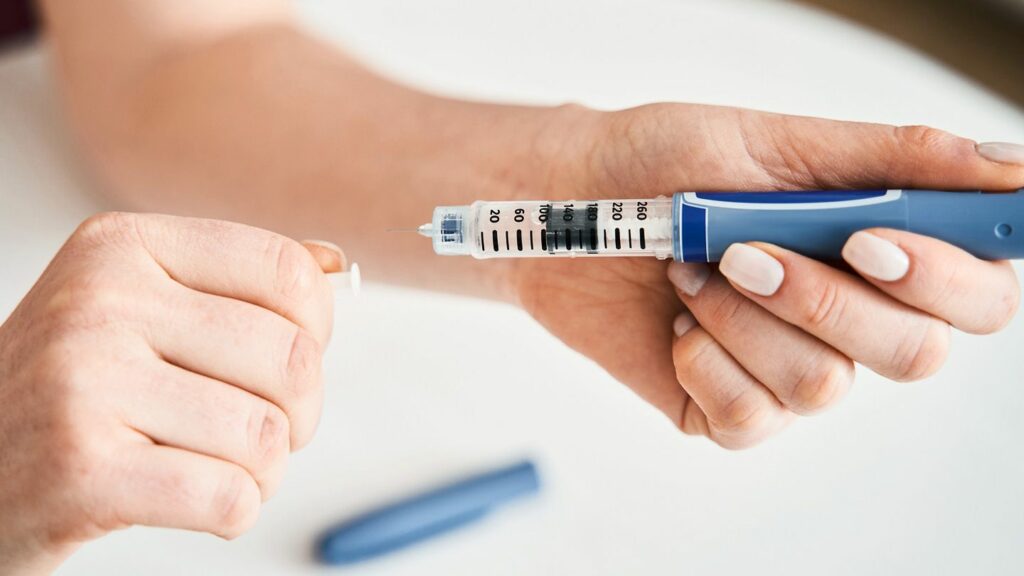Type 1 diabetes presents unique challenges that require diligent management to maintain optimal health and quality of life. Among the cornerstones of type 1 diabetes management is insulin therapy, a vital component in regulating blood sugar levels and preventing complications. This comprehensive guide explores the various aspects of insulin treatment for type 1 diabetes, from understanding its mechanisms to practical strategies for effective administration and lifestyle considerations.
Contents
What Is The Role Of Insulin Treatment For Type 1 Diabetes?
 The role of insulin treatment for type 1 diabetes is fundamental in managing the condition effectively. Without insulin, glucose builds up in the bloodstream. This leads to hyperglycemia (high blood sugar), which can result in serious complications if left untreated.
The role of insulin treatment for type 1 diabetes is fundamental in managing the condition effectively. Without insulin, glucose builds up in the bloodstream. This leads to hyperglycemia (high blood sugar), which can result in serious complications if left untreated.
Insulin treatment serves several critical roles in type 1 diabetes management:
- Blood Sugar Regulation
The therapy helps to lower blood sugar levels by facilitating the uptake of glucose from the bloodstream into cells, where it can be used for energy or stored for future use. This action helps to prevent hyperglycemia and its associated symptoms.
- Prevention of Diabetic Ketoacidosis (DKA)
In the absence of insulin, the body cannot use glucose for energy. So it begins to break down fat for fuel instead. This process produces ketones. This can accumulate in the blood and lead to a life-threatening condition known as diabetic ketoacidosis. Insulin therapy prevents DKA by allowing cells to use glucose efficiently. Thus inhibiting the excessive breakdown of fat.
- Reduction of Long-Term Complications
Consistent control of blood sugar levels through insulin treatment can help reduce the risk of long-term complications associated with type 1 diabetes. Such as cardiovascular disease, kidney damage, nerve damage, and eye problems.
- Improved Quality of Life
By effectively managing blood sugar levels, insulin therapy enables individuals with type 1 diabetes to lead active and productive lives with fewer disruptions caused by fluctuations in blood sugar levels.
Overall, insulin treatment plays a crucial role in type 1 diabetes management by regulating blood sugar levels. Ultimately, preventing acute and long-term complications. Hence, it improves the overall quality of life for individuals living with the condition.
What Is The Best Insulin Treatment For Type 1 Diabetes?
The “best” insulin treatment for type 1 diabetes varies from person to person and depends on factors such as individual insulin needs, lifestyle, preferences, and medical history. There is no one-size-fits-all approach, and treatment plans are often tailored to each individual’s unique circumstances.
That said, several types of insulin and delivery methods are commonly used in the management of type 1 diabetes:
Basal Insulin
Basal insulin provides a steady release of insulin throughout the day to mimic the background insulin production of a healthy pancreas. It helps maintain blood sugar levels between meals and overnight. Long-acting insulin analogs such as insulin glargine (Lantus), insulin detemir (Levemir), and insulin degludec (Tresiba) are commonly used for basal insulin replacement.
Bolus Insulin
Bolus insulin is taken before meals to manage the rise in blood sugar that occurs after eating. Rapid-acting insulin analogs such as insulin lispro (Humalog), insulin aspart (NovoLog), and insulin glulisine (Apidra) are typically used for bolus insulin replacement.
Basal-Bolus Regimen
Many individuals with type 1 diabetes use a basal-bolus insulin regimen. This combines basal insulin for background coverage and bolus insulin doses to cover meals and correct high blood sugar levels.
Insulin Pump Therapy
Insulin pumps deliver rapid-acting insulin continuously throughout the day (basal rate) and allow for precise insulin dosing at meal times (bolus doses). It offers flexibility in insulin delivery and may help some individuals achieve better blood sugar control.
Continuous Glucose Monitoring (CGM) Systems
CGM systems continuously monitor glucose levels throughout the day and night. Ultimately, providing real-time data to help individuals make informed decisions about insulin dosing and lifestyle adjustments.
Hybrid Closed-Loop Systems (Artificial Pancreas)
Hybrid closed-loop systems combine insulin pumps with CGM technology and algorithm-driven insulin delivery to automatically adjust basal insulin rates based on glucose levels, offering a more automated approach to diabetes management.
Ultimately, the best insulin treatment for type 1 diabetes is tailored to the individual’s needs, preferences, and lifestyle. Hence, it becomes essential for people with type 1 diabetes to work closely with their healthcare team. They will help to develop a personalized treatment plan that meets their specific needs and goals.
How Much Insulin Do Type 1 Diabetics Take?
 The amount of insulin needed by individuals with type 1 diabetes can vary widely based on factors. That includes age, weight, level of physical activity, diet, metabolic rate, insulin sensitivity, and individual insulin requirements. There is no standard or fixed amount of insulin that applies to all individuals with type 1 diabetes.
The amount of insulin needed by individuals with type 1 diabetes can vary widely based on factors. That includes age, weight, level of physical activity, diet, metabolic rate, insulin sensitivity, and individual insulin requirements. There is no standard or fixed amount of insulin that applies to all individuals with type 1 diabetes.
However, to provide a general idea, most people with type 1 diabetes require a total daily dose (TDD) of insulin that typically ranges from 0.5 to 1.0 units per kilogram of body weight per day (U/kg/day). This total dose is typically divided into basal insulin (which provides background insulin coverage throughout the day) and bolus insulin (which is taken before meals to cover the rise in blood sugar from food).
For example, a person weighing 70 kilograms (154 pounds) might require a total daily dose of insulin ranging from 35 to 70 units per day. This dose would be divided between basal and bolus insulin based on the individual’s insulin sensitivity, carbohydrate intake, and other factors.
It’s important to note that insulin requirements can change over time. This is due to factors such as changes in diet, physical activity levels, stress, illness, hormonal fluctuations, and other variables. Therefore, individuals with type 1 diabetes often need to adjust their insulin doses regularly. And it should be based on blood sugar monitoring and guidance from their healthcare team.
What Is The Cost Of Insulin Treatment For Type 1 Diabetes?
The cost of insulin treatment for type 1 diabetes can vary significantly depending on factors such as:
- the type of insulin
- dosage requirements
- brand preferences
- availability of healthcare coverage or subsidies
In general, individuals with type 1 diabetes may incur ongoing expenses for insulin, syringes or insulin pens, glucose monitoring supplies, and other related equipment. Without insurance coverage or access to government-subsidized programs, the cost of insulin therapy can pose a significant financial burden for many individuals and families.
In India, the cost of insulin treatment for type 1 diabetes can vary depending on factors such as the brand, formulation, and dosage requirements. While some government hospitals and clinics may provide insulin at subsidized rates or for free, access to affordable insulin may still be limited in certain areas, particularly in rural regions.
Private healthcare facilities typically offer a wider range of insulin options but at higher prices. This may be prohibitive for individuals with limited financial resources. Access to affordable insulin and comprehensive diabetes care remains a significant challenge for many people with type 1 diabetes in India.
What Are Some Limitations And Considerations?
 There are several limitations and considerations associated with insulin treatment for type 1 diabetes:
There are several limitations and considerations associated with insulin treatment for type 1 diabetes:
Risk of Hypoglycemia
Insulin therapy can lower blood sugar levels, potentially leading to hypoglycemia (low blood sugar). This can cause symptoms such as shakiness, sweating, confusion, and in severe cases, loss of consciousness or seizures. Managing insulin doses and carbohydrate intake to minimize the risk of hypoglycemia is an important consideration for individuals with type 1 diabetes.
Injection Site Reactions
Insulin injections can sometimes cause discomfort, pain, or irritation at the injection site. Rotating injection sites and proper injection techniques can help minimize these reactions. However, they remain a potential limitation of insulin therapy.
Weight Gain
Some individuals may experience weight gain as a side effect of insulin therapy. Particularly with certain types of insulin or when doses are not carefully adjusted to match carbohydrate intake and physical activity levels.
Cost and Access
The cost of insulin and related supplies can be a significant barrier to access for individuals without adequate insurance coverage or financial resources. Particularly in countries where insulin prices are high or healthcare services are not universally accessible.
Lifestyle Constraints
Insulin therapy requires adherence to a structured regimen of insulin doses, meal timing, and blood sugar monitoring. This can impact lifestyle flexibility and require careful planning. Particularly when traveling, exercising, or engaging in other activities outside of routine daily life.
Individual Variability
Each person with type 1 diabetes has unique insulin needs, metabolic characteristics, and lifestyle factors that can influence the effectiveness of insulin therapy. Finding the right insulin regimen and dosage adjustments may require ongoing monitoring and adjustments over time.
Addressing these limitations and considerations requires a multidisciplinary approach. This might involve healthcare providers, educators, and support systems. All of them together will ensure comprehensive diabetes care and support.
Conclusion
In conclusion, insulin treatment for type 1 diabetes is crucial for helping to regulate blood sugar levels and prevent complications. While insulin therapy offers many benefits, including improved quality of life and reduced long-term risks, it also comes with limitations and considerations. Despite these challenges, with proper education, support, and access to affordable insulin and supplies, individuals can lead fulfilling lives while successfully managing their condition.
Healthcare providers, policymakers, and communities need to work together to address these challenges. Ultimately ensure that everyone living with type 1 diabetes has access to the care and resources they need to thrive. Do you want to get rid of diabetes? Join our online diabetes treatment program and reverse Diabetes naturally through lifestyle changes such as a Personalized Diet plan, Exercise, Yoga, dieticians, and health coaches.

